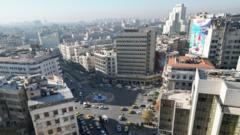The delegation includes high-ranking officials such as Assistant Secretary of State Barbara Leaf and Roger Carstens, the US President’s hostage envoy. Their mission aims to directly engage with various Syrian communities, civil society members, and activists to gather insights on the aspirations of the Syrian people and explore how the US might assist in their quest for a stable future. According to a State Department spokesperson, this engagement seeks to understand the population's needs while attempting to facilitate a transition towards inclusive governance.
Despite HTS's designation as a terrorist organization by the US, this meeting signals America’s willingness to work with them on the premise of encouraging non-sectarian governance. By establishing conditions for possible de-listing of the group, the US is attempting to address the pressing need for sanctions relief that Syria requires for its rebuilding efforts. In addition, the delegation is focused on gathering information regarding the case of American journalist Austin Tice, who has been missing since his abduction in Damascus in 2012.
As Western nations, alongside the UN, bolster their diplomatic presence in Syria post-Assad, the efficacy of these meetings in reshaping the country's future remains to be seen. The developments prioritize dialogue over isolation, channeling efforts towards potentially productive engagement amid years of protracted conflict.
In summary, this diplomatic initiative is indicative of a broader strategy by the West to influence Syria's governance while cautiously engaging with groups previously deemed problematic. The repercussions of this approach could significantly affect the regional dynamics in the wake of lasting turmoil.
Despite HTS's designation as a terrorist organization by the US, this meeting signals America’s willingness to work with them on the premise of encouraging non-sectarian governance. By establishing conditions for possible de-listing of the group, the US is attempting to address the pressing need for sanctions relief that Syria requires for its rebuilding efforts. In addition, the delegation is focused on gathering information regarding the case of American journalist Austin Tice, who has been missing since his abduction in Damascus in 2012.
As Western nations, alongside the UN, bolster their diplomatic presence in Syria post-Assad, the efficacy of these meetings in reshaping the country's future remains to be seen. The developments prioritize dialogue over isolation, channeling efforts towards potentially productive engagement amid years of protracted conflict.
In summary, this diplomatic initiative is indicative of a broader strategy by the West to influence Syria's governance while cautiously engaging with groups previously deemed problematic. The repercussions of this approach could significantly affect the regional dynamics in the wake of lasting turmoil.



















